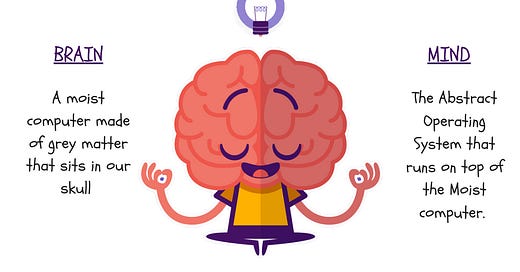Hey👋
Whatsup?
Will keep this really short.
Today we continue our series on cognitive biases, but take a look at it from a different angle — We try to explore why they happen at all.
And we have a major announcement coming up soon, probably next week, but you can get a sneak peek at it at the bottom.
But first, let’s talk about the moist computer👇
The Moist Computer
Our Brain, this little thing 👉 🧠 is 10,000-year-old hardware stuck battling 21st-century software.
It’s hardwired to conserve every ounce of energy it can. It gorges on sugar like there’s no tomorrow.
And looks for shortcuts all day long.
Just so that it can last another day on this planet.
Totally unaware that we are not being hunted by hungry lions anymore, and we have an endless supply of sugar right down every grocery store aisle.
Our brain is a moist computer that sits in our skull. It’s a 1.5kg piece of grey matter.
It’s the physical squishy thing that houses a web of nerves. Just like a computer, it has algorithms that work on inputs and gives outputs.
But because it runs on the grey matter instead of silicon, its algorithms are hard to understand and predict.
That’s why we need the powers of The Abstract OS to make sense of the world.
The Abstract OS
Our Mind, (no there is no emoji for it!) is The Abstract Operating System that runs on top of the Moist computer.
We use the terms Mind & Brain interchangeably in popular culture, but it’s important to create a differentiation.
To understand the difference, it’s important to adopt this vocabulary. (will come back to this in a bit)
Your mind has no physical presence. It just sort of emerges from the neural action going on in the brain.
An OS is a workable analogy for our mind because even software has no tangible existence. And yet it is so powerful!
Our ability to think, analyze, reflect, emerges from the mind. Our sense of self emerges here, our consciousness emerges here.
Our mind is what separates us from the monkeys.
We use tools in our minds to make the best use of our brains.
But sometimes we fall for the brain’s follies— and our minds are ill-equipped to deal with them.
These follies are the cognitive biases that impact us.
Why the difference matters
Having a differentiated vocabulary for the brain and mind helps us understand what is and isn’t in our control.
Our brain works on chemical stimulation throughout the day.
The body is like a non-stop biochemical process. Continuously reacting to external and internal inputs.
It’s hard for us to control these external inputs.
It’s even harder for us to control the chemical reactions in our brain to these external stimulations.
So what can we do?
We can use our Minds to be watchful of these reactions.
A simple example of “Mind Your Brain”
When we are under stress the body releases cortisol. It’s a hormone that kicks off the “fight or flight” response in our body.
It is the perfect chemical to survive and thrive in the wild.
But we no longer live in the wild.
We can’t act under cortisol in every stressful situation. We will run out of energy and exhaust ourselves.
Especially because today we are hammered with micro-stresses all day long.
We use our “Mind” to deal with cortisol. When we are stressed, we take a deep breath and start to feel relaxed.
A calm, deep breath signals to the body that things are under control. There are no hungry lions approaching.
The brain notices this and reins in the cortisol supply, and we start to feel better.
You know the old adage — “You can’t control what happens to you, but you can control how you respond to what happens to you.”
Yea, there’s a lot of stoicism there. But there is logic there as well.
Signing off for the week, here’s something to think about—
We can choose to follow every urge of the brain, fall for anger, insecurity, and envy.
Or we can let better sense prevail, use our minds, go to the root of our “feelings”, understand them, and give a measured response.
That’s what makes us humans right?
Thank You for reading 🙏
Have a great weekend!
Next week, we take a quick look at the follies of the moist computer.
We round up the 5 most impactful cognitive biases that we have talked about over the past few months.
Till then, take care of yourself👍
Love,
Aditi & Ayush




